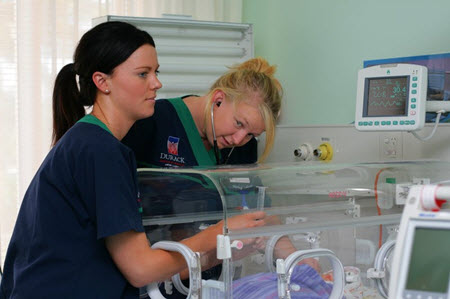With recent trends and demands in the healthcare industry, there are now a lot of ways for you to get into the nursing profession without having to go through the long grueling years in nursing school. By being a vocational nurse, you’ll be able to land a job in a range of different medical facilities and provide various services to patients, nurses and doctors.
While some people consider vocational nursing as their dream job, there are others who take it as a faster route to being a registered nurse. No matter what your take is, here are a few essential things you need to know first about being a vocational nurse.
1. Is vocational nursing for you?

In case you have immediate needs and couldn’t afford to spend a lot of time building a nursing career, one of your best options is to take vocational nursing. If you are focused and mentally stable enough to handle stressful situations, this job might be perfect for you.
Other qualifications of vocational nursing include:
• Physically strong to be able to assist patients with ambulation
• Can think quickly and independently
• Able to determine patient needs and conditions that require urgent attention
• Can focus on task at hand
• Must have good communication skills
• Keen with details and information
2. How can you be one?
To get started, aside from your high school diploma, you’ll be required to get a certificate from an LPN program endorsed by your state’s nursing board. It typically lasts for one whole year but can vary depending on the requirements or program of your college.
An LN program covers the basics of nursing, pharmacology and biology. Aside from classroom learning, you’ll also undergo a training period in hospitals and other clinical settings under the supervision of a registered nurse.
After securing a certificate, you’ll need to take the National Council Licensure Examination to get licensed.
3. How much salary should you expect?
As an LVN, there’s actually a lot of work available for you. You can apply in nursing homes, long-term care facilities and even hospitals.
Dialysis centers, outpatient clinics and blood banks can hire vocational nurses, too. And as the size of the American patient population continues to rise, you can expect more work opportunities.
As for salary, it’s not as high as what nurses earn. The expected salary of vocational nurses averages at $44,000 while a registered nurse earns an average of $64,000 annually. You can get paid higher or lower depending on your state and its population trend. Your specialty can also affect how much you earn.
And the good news? LPN salary is expected to continuously increase as job growth is assumed to rise by as much as 16% until 2024.
Also Read: Top 10 Highest Paying Cities for Nurses
4. Opportunities for a Vocational Nurse

If you are aiming for higher education or more skills, you can enroll in a bridge-nursing course and be a registered nurse. You’ll be able to receive a higher pay, autonomy and the opportunity to manage other nurses and vocational nurses.
There are two ways for you to transition from LN to RN. One is to take a BSN program which can take around two to four years to complete, depending on the program of your chosen university. In case you’re looking for a shorter and less expensive program, you can choose to get an Associate’s Degree in Nursing.
Although requirements for the transition can vary, you need to have the following items to be considered:
• An LPN license
• Six months of LPN working experience
• Your high school diploma
• Passing score on the university’s entrance exam
After getting your degree, you can apply for licensing and registration with your state’s board of nursing so you can proceed with taking the National Council Licensure Examination for Registered Nurses.
In case you’re planning on furthering your LVN career, you can take advance IV therapy training or pursue other clinical specialties. Being a certified specialist can boost your paycheck as well as your career. It will give you more opportunities to provide direct patient care and perform additional medical procedures than what a regular LVN does.
Examples of certifications and specialties for LVN include:
• Developmental Disabilities Certification
• Clinical Labor Support Specialist
• Prenatal and Postnatal Fitness Specialist
• Certified Breastfeeding Counselor
• Pharmacology Certification
• Hospice and Palliative Care Certification
5. Difference between a registered nurse and vocational nurse
There are three main things that set vocational nurses apart from registered nurses.
Scope of practice
Licensed vocational nurses don’t work independently and their scope of practice is quite limited. They have to be supervised by a registered nurse or a physician while at work. Registered nurses, meanwhile, have dependent, independent and interdependent functions in the clinical setting.
Also Read: Q & A: How to Become a Registered Nurse
Job duties
If you are planning on taking vocational nursing, your job will include assisting patients with their activities of daily living, monitoring their vital signs and providing bedside care. You will also be responsible for changing wound dressings, providing assistance during rehabilitation therapy and monitoring and reporting patients’ health status to the nurse or doctor. In some instances, experienced LVN can be assigned to oversee and manage other vocational nurses and unlicensed medical personnel.
Registered nurses, on the other hand, administer medications and treatments to their patients. They are also responsible for communicating patient care plans and conducting health teachings to both patients and family members. In certain cases, they also perform diagnostic tests and interpret results.
Licensing and certification
Aside from their job duties, they also differ in their education and licensing. While vocational nursing programs can be finished within a year, a nurse has to go through four years in nursing school for their degree in Bachelor of Science in Nursing. An Associate Degree in Nursing can take two to three years to complete. Both LPN and RN require certification and licensure before they can get to work.



















